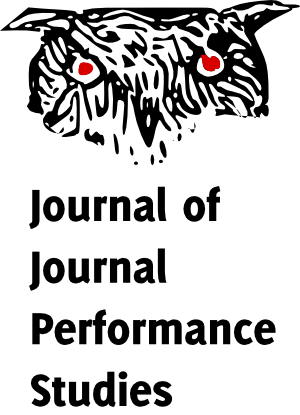Recent News
Posted on Mon, 12 Dec 2016 14:45:03
Retiring JJPS
After nearly six and a half years it has come time to shut down the Journal of Journal Performance Studies. Thanks to everyone who has looked at the project or written about it over the years. And thanks especially to Turbulence.org for commissioning the project. This website will remain as a static archive going forward.
Concerns remain about the ultimate direction and future of academic publishing. I hope that this project can act as potential inspiration for future scholar-activists in this area.
CommentsPosted on Thu, 17 Jan 2013 12:30:14
RIP Aaron Swartz
There is little that we can add regarding the recent tragic suicide of Aaron Swartz. Suffice it to say that our own interventions into academic publishing will continue and will hopefully contribute in their own way towards furthering Swartz’ own cause.
Here are some other thoughts on Swartz’ passing:
Glenn Greenwald: Carmen Ortiz and Stephen Heymann: accountability for prosecutorial abuse , The inspiring heroism of Aaron Swartz
danah boyd: processing the loss of Aaron Swartz
fffffat lab: A moment of silence for Aaron Swartz
CommentsPosted on Sun, 15 Jan 2012 14:20:00
JJPS in FILE RIO 2012
I’m pleased to say that the Journal of Journal Performance Studies will be shown in FILE RIO 2012 as part of the Media Art Category. The exhibition will take place at the Art Galery of Oi Futuro – Flamengo in Rio de Janeiro from 12 March to 8 April 2012. More details will be posted as they become available to me.
CommentsPosted on Sun, 30 Oct 2011 21:55:08
JJPS Firefox extension updated
I have updated the JJPS Firefox extension so that it is compatible with Firefox versions up to 9 (which I don’t think exists yet…). Apologies for the delay in updating; creating new Firefox extensions is one of the most annoying tasks for any extension developer, and Firefox’s recent decision to move towards faster release cycles does not help matters. Hopefully the extension will update automatically; if it doesn’t, you might have to remove it and re-install.
CommentsPosted on Mon, 13 Jun 2011 15:05:28
The future of academic publishing? More copyright policing.
From a paywall article at the CHE, comments from a recent academic publishing conference that suggest more policing of the distribution of academic work online:
University Presses Are Warned to Guard Copyrights While Sharing Their Wares
By Jennifer Howard
Baltimore
University presses have injected a lot of energy lately into collaboration: with each other, with their parent institutions, and with academic libraries. But this month, at the presses’ annual meeting, the appeal of collaborating ran up against worries that their strongest asset, intellectual property, is under threat.
Collaborate and share-but protect your copyrights: That was the sometimes conflicting message heard at the Association of American University Presses gathering here. “Copyright is under constant attack today,” Jon A. Baumgarten, a veteran intellectual-property lawyer, told the crowd at a plenary session on “Back to the Future of Copyright.” He advised the press association to be vigilant.
Almost 700 scholarly-publishing professionals registered, making it one of the association’s largest meetings ever. (Last year’s meeting, in Salt Lake City, had 534 people registered.) The copyright debate took place alongside other sessions with a practical turn, as attendees compared notes on how to acquire, produce, and market scholarly books and journals at a time when many presses are under financial strain. And not surprisingly, e-books continued to be a hot topic.
A “rah, rah, rights” tone was set the first evening, in a keynote speech by David Simon, a former journalist and the creator of the HBO series The Wire. Mr. Simon gave the crowd a pep talk about the importance of doing something for its own sake, without regard for commercial reward. But creating that kind of work has to be supported somehow, he said, pointing to the decline of mainstream newspapers as an example he has lived through. That decline wasn’t the fault of the Internet, he said, but of newspaper owners devaluing their own product, gutting reporting operations, and giving away content.
“Intellectual property needs to be fought for,” Mr. Simon told the crowd in his hard-bitten reporter’s manner. “Copyright matters.” His listeners broke into applause.
Nobody wanted to talk on the record about what could be a pivotal battle in the war over copyright and fair use: the current legal case in which three scholarly publishers-Cambridge University Press, Oxford University Press, and SAGE Publications-charge that Georgia State University was overly liberal in its use of their copyrighted material in library e-reserves and on university Web sites.
Even publishers not directly involved in the litigation have been reluctant to comment about the lawsuit publicly. The case has been a reminder that publishers and libraries continue to have very different ideas about when and how much users ought to pay to use copyrighted material. And it’s unfolded at a time when university presses have stepped up efforts to figure out better ways to market e-books to libraries.
Publishers don’t want libraries to share too much copyrighted material without paying for it, but they also don’t want to alienate libraries as customers. A packed room heard pitches about four ventures on track to sell aggregations of scholarly e-books to libraries.
The projects are being developed by Project MUSE, JSTOR, Oxford University Press, and Cambridge University Press-the last two also plaintiffs in the Georgia State case. Michael Levine-Clark, a panelist and collections librarian at the University of Denver, gave listeners a detailed list of what libraries want from publishers trying to sell them e-books: flexible pricing, simultaneous availability of digital and print editions if a book’s coming out in both formats, and as few restrictions on use as possible.
Fighting Piracy
Pirated copies of their books have been a concern for scholarly publishers, although it’s not clear how many sales piracy has cost them. A session on “Is Piracy Good for Sales?” didn’t answer the question. But the worry is real enough, for authors as well as for publishers. The session’s moderator, Garrett P. Kiely, director of the University of Chicago Press, recounted his experience with Attributor, a company that tracks down pirated online copies of clients’ copyrighted material and helps them get that material taken down. Lately the Chicago press has had about 250 takedowns a month, according to Mr. Kiely.
Attributor’s services cost about what it would cost to hire a junior-level staffer for a year, Mr. Kiely said in a conversation later with The Chronicle. The Chicago press plans to do a six-month review soon to determine whether Attributor is worth it.
Protecting copyright is not just about possible sales revenue. The market for many scholarly books is likely to be specialized and small, but still, as Mr. Kiely put it, for authors “there’s a pride of ownership.”
CommentsPosted on Thu, 09 Jun 2011 11:18:26
Academic Libraries and the First Sale Doctrine
From the Chronicle of Higher Education , but hidden behind a paywall (and thus posted entirely below). It would seem that too many academic libraries are considering allowing publishers to create licenses for books, rather than selling them outright, thus obviating the first-sale doctrine, the legal right that allows us to resell and lend things we have purchased, and that thus allows libraries to exist. It’s sad, but it would appear that the fears of Richard Stallman as outlined in his short story “Right To Read” are becoming true.
Librarians Puzzle Over E-Books They May Buy but Not Truly Own
By Jennifer Howard
Buy a print book and it’s yours forever. Buy access to an e-book and a publisher can set limits on what you do with it. Recently, public libraries have had a tussle with a commercial publisher, HarperCollins, over e-book use. Academic libraries and scholarly publishers are watching closely.
In February, HarperCollins announced a checkout limit for new e-books it licensed to libraries. Twenty-six was the cutoff, the publisher said. Once that limit was reached, it would be time to pay for another round of access-the equivalent, irate librarians argued, of having to buy another copy of a print book.
The debate prompted calls for a boycott of HarperCollins. As of May 10, more than 65,000 people had signed an online petition, “Tell HarperCollins: Limited Checkouts on E-Books Is Wrong for Libraries.”
That kind of negative publicity catches the attention of other publishers and librarians, even if they don’t traffic much in the kinds of popular material HarperCollins handles. James R. Mouw is the electronic-resources officer and interim head of collections at the University of Chicago libraries. “We’ve certainly been tracking the whole HarperCollins thing closely,” Mr. Mouw told me. When a publisher introduces a pricing model “where maybe once you buy it, you don’t have it forever,” it’s a trend that research libraries need to watch, he said. “When we buy a book, we’re buying it for the long term.”
Nearby, at the University of Chicago Press, they’re also keeping tabs on the HarperCollins situation. “I’ve been saying to people that though I don’t agree with the exact way HarperCollins has approached this, I do appreciate that they’ve brought this into the open a little bit,” said Garrett P. Kiely, the press’s director. “We haven’t really dealt with these issues of how we treat libraries.”
He thinks that scholarly publishers have come at the problem obliquely. “We’ve made conscious decisions not to include certain of our books in our e-books programs that are aimed at libraries,” Mr. Kiely told me. “I’m talking about books that are aimed at courses.”
Many academic books would be lucky to find 26 readers. If a book takes off as course reading, though, the number of times it’s bought or accessed becomes a bottom-line issue for its publisher. The trouble is, it’s very hard to predict which books are likely to take off as required reading, and a press like Chicago’s doesn’t want to withhold books from library markets, Mr. Kiely said. But “the question is, How much does it impact your text sales, the revenue that publishers rely on so much?”
So far no university press or scholarly publisher that I know of has tried to pull a HarperCollins on its library customers. They will have to confront usage restrictions, though, as they put more effort into serving the e-book market.
Lending With Limits
In the last few months, several consortial e-book platforms aimed at academic libraries have been announced, including the University Press Content Consortium, or UPCC, run by Project MUSE, and Books at JSTOR. Oxford University Press and Cambridge University Press are also in the race. The consortia and participating publishers will have to decide how far libraries and their patrons can go in using their e-books-and what to do about the books that do turn out to be sought-after hits. “Frankly, this is a question that the JSTOR, Project MUSE, and Oxford models for academic publishers have to face,” Mr. Kiely said. “I would say it hasn’t been satisfactorily resolved on any of those platforms.”
I asked Dean Smith, director of Project MUSE, about limits on e-book lending. “We are providing a research platform, not circulating the latest Anne Tyler novel,” he said in an e-mail. “We are providing unlimited use governed by a purchase agreement-our content will be usable on any device that can read PDF files by any user accessing it within their institution’s network.” Mr. Smith added, “We will monitor this usage for abuse.”
It will be interesting to see what counts as abuse. A JSTOR representative said it had yet to settle on an e-book-lending policy. That may be left to publishers anyway.
As HarperCollins attempts to set limits on the library market, academic e-book players are looking to strengthen their own positions. Over the last year and a half, several key distributors or aggregators have been bought up by larger publishing operations: Gale/Cengage bought Questia, ProQuest picked up Ebrary, and Ebsco acquired NetLibrary.
“So all of a sudden you had what were fairly limited businesses integrated with much larger business,” said Douglas Armato, director of the University of Minnesota Press. The consolidations come at a time when “you have every single press defining what they believe in, what they think will work, what they think their business model will be,” he said.
All of this indicates that we’re in an intense period of shaking up and shaking out in the academic corner of the e-book market. More evidence if you need it: Ebrary announced this month that it was testing a beta version of “the industry’s first usage-triggered model for short-term loans” to libraries.
The system arranges limited-time access to an e-book for a percentage of its purchase price.
As scholarly publishers and distributors test different e-book models, academic libraries have their own sorting out to do. For instance, how should interlibrary loan work with e-books? “Everything is sort of up in the air, both in terms of the cost and the user impact,” according to Robert Byrd, associate university librarian for collections and user services at Duke University. If Mr. Byrd’s library purchases a multiple-user license for an e-book and someone elsewhere in the Triangle Research Libraries Network wants to use it, will a Duke patron be able to use it at the same time?
When a print book gets checked out by a borrower, nobody else can use it. With e-books, the equation is a lot more complicated. “The usage pattern is so different from a borrowing pattern,” Mr. Byrd said to me. “With print materials, a lot of our users still expect to be able to check something out and keep it for the semester or the year. They blithely accumulate little libraries in their offices. With e-books, our expectation is that the content is readily available to them at any time.”
CommentsPosted on Sun, 29 May 2011 19:48:06
Some recent posts re: scholarly publishing
Here’s some recent posts of interest regarding scholarly publishing:
Publishers Criticize Federal Investment in Open Educational Resources
Yes, you read the headline right. From the article:
But the grants come at a challenging time for textbook publishers, in particular, which have seen print-textbook revenues decline while a model for digital course materials is still emerging. The federal government is seen as an unwelcome new player.
And then, in the ongoing saga at Georgia State University regarding access to course reserves:
A nightmare scenario for higher education
From the article:
CommentsIn anticipation of the trial starting on Monday in the copyright infringement case brought against Georgia State University by Cambridge, Oxford and Sage publishers, and partially financed by the Copyright Clearance Center, there has been a flurry of motions, mostly relating to the admission of various pieces of evidence. But amongst that deluge of paper is a truly frightening document, the proposed injunction that the plaintiffs are requesting if they win the case. I have always known that there was a lot a stake for higher education in this case, but the injunction the publishers want would be a nightmare scenario beyond even my most pessimistic imaginings.
Posted on Sun, 29 May 2011 15:08:28
News Update
Two news updates:
- JJPS will be shown in the FILE festival this year in Sao Paulo! I’m honored to be selected for the second year in a row (last year MAICgregator was shown).
- JJPS has now been updated to work on Firefox 4.0 as well. This is the main change in the release, although some other things are brewing in the background if you take a look at the preferences. You should receive the update automatically. If you have any problems, let me know at editor [[at]] journalofjournalperformancestudies {{dot}} org.
Posted on Fri, 11 Mar 2011 00:48:17
JJPS Selected in Memefest Beyond Category!
I’m proud to say that the Journal of Journal Performance Studies was selected as one of the “best works” in the Beyond category of this year’s memefest! You can read the curators comments . Be sure to look at the other winners. Thanks to the curators for this great honor! As a note this is the second memefest award I’ve been luck enough to receive, as my earlier project Fluid Nexus was also awarded.
CommentsPosted on Thu, 09 Dec 2010 23:24:22
Future of Academic Publishing in Anthropology
See this excellent, extremely detailed memo by the Cultural Anthropology section of the American Anthropology Association on their own trials and tribulations with academic publishing presently, and their suggestions for what could be done.
CommentsPosted on Sun, 05 Dec 2010 11:12:55
JJPS Extension 0.1.1 Released!
I have released an updated version of the JJPS Extension. This version corrects some of the problems on a few publisher websites, such as Sage, IngentaConnect, and SpringerLink. Expect more corrections in the near future! As usual, any questions or comments should go to editor at journalofjournalperformancestudies {{dot}} org.
Comments


